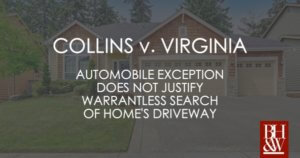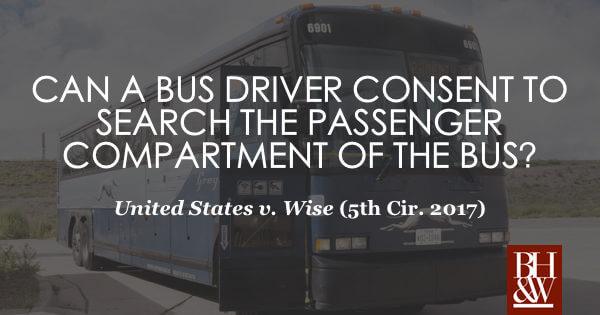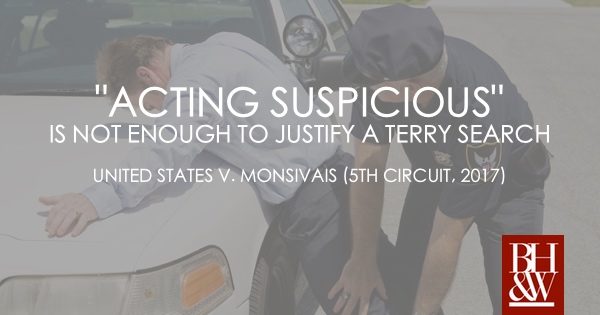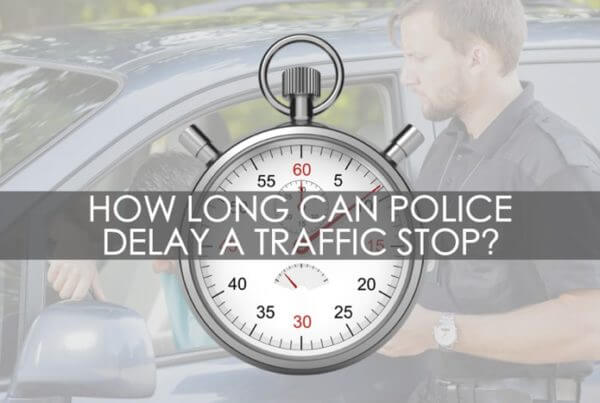Collins v. Virginia – US Supreme Court Considers Whether Police May Search a Vehicle in a Driveway Without a Warrant
Collins v. Virginia (US Supreme Court 2018)
 In Collins v. Virginia, police officers were looking for a motorcycle that they suspected was stolen. They tracked the motorcycle to a home where it appeared to be parked in the driveway and covered by a tarp. Officers walked up the driveway, removed the tarp, discovered the motorcycle and conducted a search of the license plates. The license plate search indicated that the motorcycle was indeed stolen. The officers then replaced the tarp over the motorcycle and waited in their car for the driver of the motorcycle. When Collins appeared, they arrested him.
In Collins v. Virginia, police officers were looking for a motorcycle that they suspected was stolen. They tracked the motorcycle to a home where it appeared to be parked in the driveway and covered by a tarp. Officers walked up the driveway, removed the tarp, discovered the motorcycle and conducted a search of the license plates. The license plate search indicated that the motorcycle was indeed stolen. The officers then replaced the tarp over the motorcycle and waited in their car for the driver of the motorcycle. When Collins appeared, they arrested him.
Collins’s Motion to Suppress the Warrantless Search
In the trial court, Collins made a motion to suppress evidence, claiming that the officers violated his 4th Amendment right when they entered the curtilage of his home and conducted a warrantless search of the driveway. The trial court denied the motion and Collins was convicted of Receipt of Stolen Property. The Virginia appellate court and State Supreme Court affirmed Collins’ conviction, reasoning that the “automobile exception” to the warrant requirement applied to the search in this case.
What is the Automobile Exception to the Warrant Requirement?
Generally, the “automobile exception” to the 4th Amendment allows officers to search a vehicle without a warrant if they have probable cause. The rationale behind this exception is that automobiles should be treated differently than houses because of the “ready mobility” of the automobile. Virginia argued that the automobile exception should apply in this case, because the motorcycle was capable to being driven away from the home.
Supreme Court Overturns the Virginia Courts, Defining the “Curtilage” of the Home to Include the Driveway
The US Supreme Court, Justice Sotomayor writing for a nearly unanimous court, held that the officers violated Collins’ 4th Amendment right to be free from unreasonable searches and seizures. The Court emphasized that the area of the driveway where the motorcycle was parked was a protected area of the home.
[T]he part of the driveway where Collins’ motorcycle was parked and subsequently searched is curtilage. When Officer Rhodes searched the motorcycle, it was parked inside a partially enclosed top portion of the driveway that abuts the house. Just like the front porch, side garden, or area “outside the front window,” that enclosure constitutes “an area adjacent to the home and ‘to which the activity of home life extends.’ “
Justice Sotomayor further explained that:
Nothing in this Court’s case law suggests that the automobile exception gives an officer the right to enter a home or its curtilage to access a vehicle without a warrant. Such an expansion would both undervalue the core Fourth Amendment protection afforded to the home and its curtilage and “ ‘untether’ ” the exception ” from the justifications underlying’ ” it.
In holding that the search violated the 4th Amendment, the Court reversed the decision of the Virginia Supreme Court and remanded to case back to the state.
Takeaway
The curtilage of the home extends to the driveway and items that might be found therein. Of course, if the officers had been able to view the license plates from the street, without removing the tarp, things would likely be different. However, as it stands, the Supreme Court is unwilling to adopt any rule that would allow police to enter the curtilage of the home to conduct a warrantless search.










